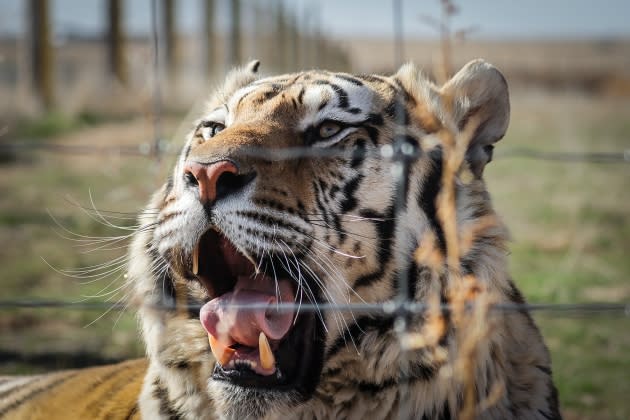‘Tiger King’ Helped Send Protection for Big Cats to Joe Biden’s Desk
- Oops!Something went wrong.Please try again later.
- Oops!Something went wrong.Please try again later.
- Oops!Something went wrong.Please try again later.

In a decision that will likely elicit plenty of purrs, the Big Cat Safety Act is headed to President Joe Biden’s desk for a final signature after the Senate passed it Tuesday night by unanimous consent.
The law, which has been in the works for more than a decade, would close loopholes in the 2003 Captive Wildlife Safety Act, which banned the sale and trade of big cats as pets. The new resolution bans the private breeding and possession of tigers, lions, leopards, and panthers, making exceptions for zoos, sanctuaries, and colleges.
More from Rolling Stone
Is Andrew Tate Really Paying All of Joe Exotic's Legal Bills?
Doc Antle, Zoo Owner from 'Tiger King,' Indicted for Alleged Wildlife Trafficking, Money Laundering
The act received a significant boost in public interest and support following the premiere of the Netflix Documentary Tiger King. The series documented the exploits of Joe Exotic (legal name Joseph Maldonado-Passage), who at the height of his cub-petting operation owned around 200 large-breed cats. Exotic was accused of euthanizing more than 100 of his animals once their profitability diminished. The series cast a spotlight on the dangers of private wildlife ownership, including animals biting and maiming Exotic and other employees.
Exotic was sentenced to 21 years in prison on 17 charges of animal abuse and two counts of attempted murder-for-hire related to a plot to kill Big Cat Rescue sanctuary owner Carole Baskin, one of the most public supporters of the bill. “For me, this fight for the big cats was never personal,” Baskin said in a joint statement released by advocates for the bill. The coalition includes the nonprofits Animal Wellness Action, The Animal Wellness Foundation, and The Center for a Humane Economy. “This was always about developing a national policy to shut down the trade in these animals as props in commercial cub handling operations and as pets in people’s backyards and basements,” she added.
“Passing the Big Cat Public Safety Act into law is a worthy cause for celebration, both for the animals themselves and public safety,” House Committee on Natural Resources Chair Raúl M. Grijalva told Rolling Stone. “Treating tigers, lions, and other big cats like house pets—or worse, making them props for photo ops at cheaply maintained tourist traps—is abusive to these animals and puts the communities they’re in at risk.”
Grijalva extended his gratitude to Rep. Mike Quigley (D-Ill.), who championed the bill and led bipartisan negotiations for its passage. Marty Irby, executive director at Animal Wellness Action, applauded Sen. Richard Blumenthal (D-Conn.) and Susan Collins (R-Me.) for their work securing the bill’s passage in the Senate. This process has been “ongoing for a decade,” Irby told Rolling Stone. “Without a doubt Tiger King and Carole Baskin’s celebrity were a key ingredient in getting this done.”
Irby expressed a sense of relief at the timing of the bill’s passage, pointing to Arkansas Rep. Bruce Westerman as a primary opponent of the bill in Congress. Despite the bill having significant support both in and out of Congress, Westerman, the ranking Republican on the House Committee on Natural Resources, accused the act of “grossly overreaching,” and “creating yet another regulatory framework and stripping away states’ rights.” Westerman is a likely candidate for the chairmanship of the Committee on Natural Resource in the new congress, a scenario which Irby says would have resulted in the bill being “dead in the water.”
The bill had three holds placed on it by three Republican senators. Irby credits the commitment of advocates to education and engagement with lawmakers in order to secure the act’s passage, as well as its importance to public safety. “The National Sheriffs Association was a big big part of our coalition,” Irby said. Beyond the issue of animal welfare, advocates see the matter of private ownership of wildlife as a public safety risk. Irby pointed to incidents like the 2011 Zanesville, Ohio animal escape in which dozens of wild animals, including lions, tigers, monkeys, bears, and wolves were intentionally released from their enclosures at a private zoo and into the community. Law enforcement was forced to euthanize 48 of the animals.
“The tigers and lions bred for the pet trade or roadside attractions never lead good lives,” the coalition wrote in their statement. “They typically live in substandard conditions, and in almost every case, their lives end tragically.”
Best of Rolling Stone
